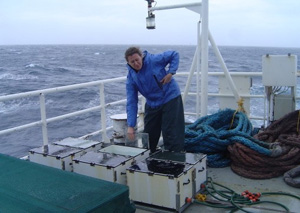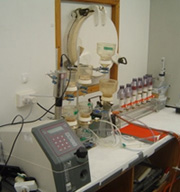Cruise
Log: Tuesday, March 23, 2004
|
March
|
|
Sun
|
Mon
|
Tue
|
Wed
|
Thu
|
Fri
|
Sat
|
|
|
1
|
2
|
3
|
4
|
5
|
6
|
|
7
|
8
|
9
|
10
|
11
|
12
|
13
|
|
14
|
15
|
16
|
17
|
18
|
19
|
|
|
|
|
23
|
|
|
|
|
|
|
|
|
|
|
|
|
|
April
|
|
|
|
|
|
|
|
|
|
|
|
|
|
|
|
|
|
|
|
|
|
|
16
|
17
|
|
18
|
19
|
20
|
21
|
22
|
23
|
24
|
|
25
|
26
|
27
|
28
|
29
|
30
|
|
|
 |
Jill
Peloquin checking the sea water incubators that will be used
for our phytoplankton growth and grazing experiments. (Photo
by Julie Hall)
|
|
 |
One
of the laboratories set up by the biology group for processing samples
collected while at sea. (Photo by Julie Hall)
|
Contributor: Julie
Hall, NIWA
This morning at 7:00 a.m. we arrived at Taiaroa Heads off Dunedin to meet
a ship's pilot to take Tangaroa into Port Chalmers. We have had to come
into port as an instrument critical to our experiment has broken down and
we have had to pick up a replacement from the University of Otago. I think
quite a few of the scientific crew are pleased to be in port as it was pretty
rough at sea yesterday and quite a few people were seasick and stayed in
their bunks most of the day. Today the weather is even worse so it is a
good day to have to spend time in port. We do need to leave as soon as possible
though, otherwise we will run out of time to complete our experiment before
we have to return to Wellington.
Biology Group
The biology group
on the research cruise is a multinational group with team members from
New Zealand, England, Finland, Australia and the USA. The group is focused
on measuring the growth of bacteria, phytoplankton (small free floating
single cell plants), and also the zooplankton (small animal plankton)
that feed on the bacteria and phytoplankton. Together these critters play
a crucial role in controlling the concentration in the ocean of climatically
important gases like CO2 and other greenhouse gases. Far fetched as it
may seem, microbes are essential modulators of our atmosphere. For instance,
they create the high oxygen levels in our planet's atmosphere that we
rely on. By stimulating the growth of the phytoplankton, we expect to
see effects on the food web and the production or consumption of gases
such as CO2 that are important to the atmosphere. The members of the biology
team are: Julie Hall (NIWA Hamilton), Karl Safi (NIWA Hamilton), Stu Pickmere
(NIWA Hamilton), Jill Peloquin (Virginia Institiute of Marine Science,
USA), Steve Archer (Plymouth Marine Laboratory, UK), Jorma Kuparinen (University
of Helsinki, Finland), Graham Jones (Southern Cross University, Australia).
Next Day >>
|